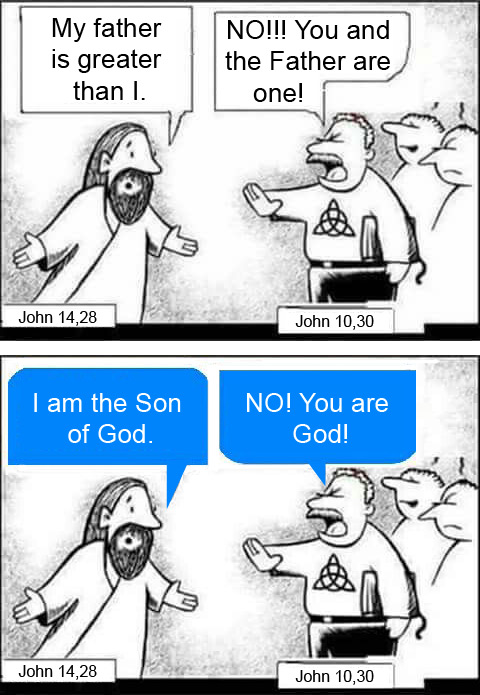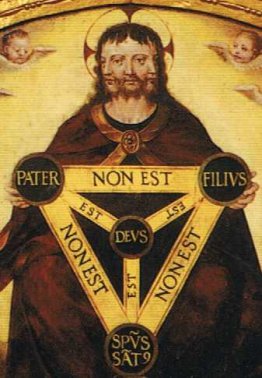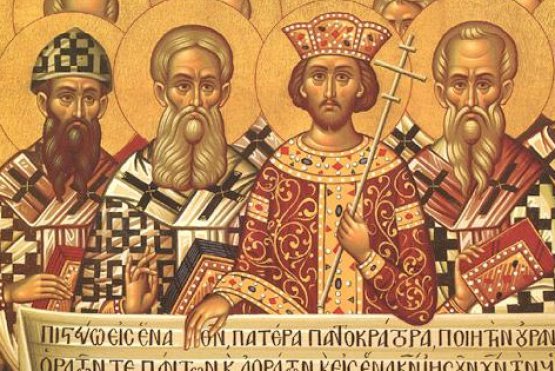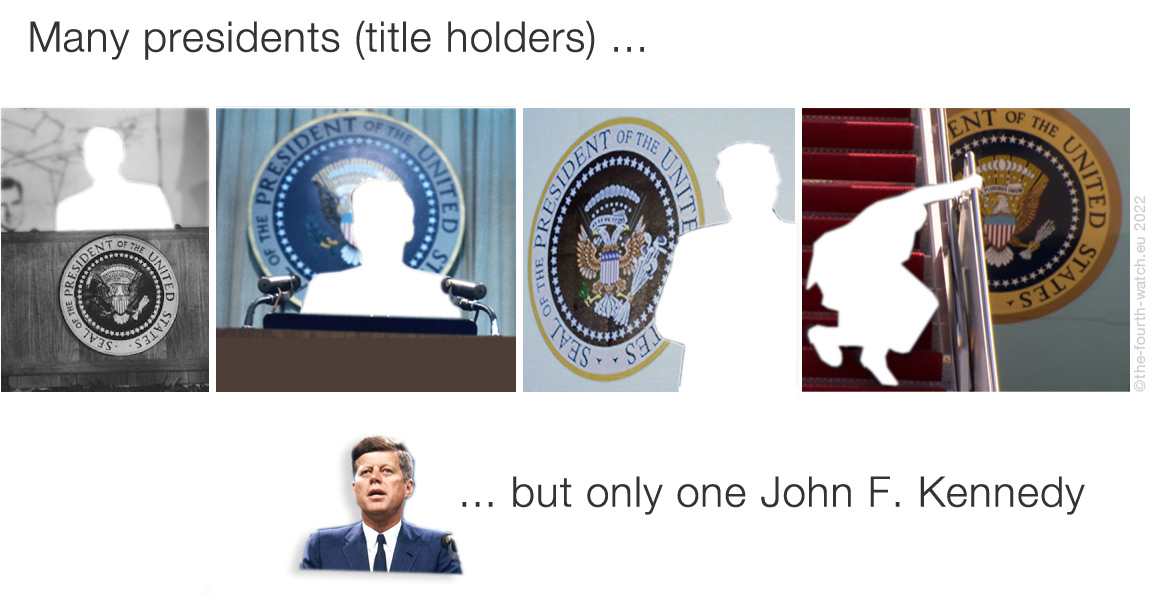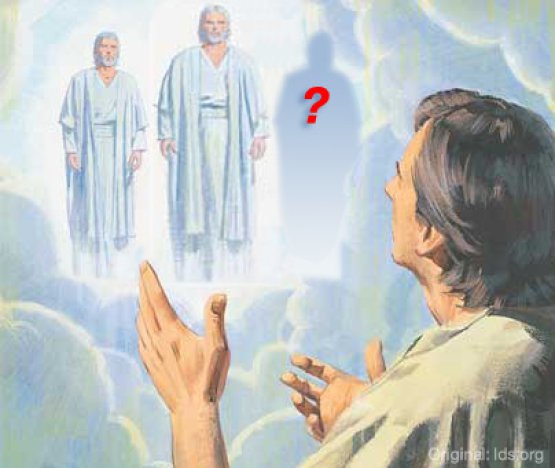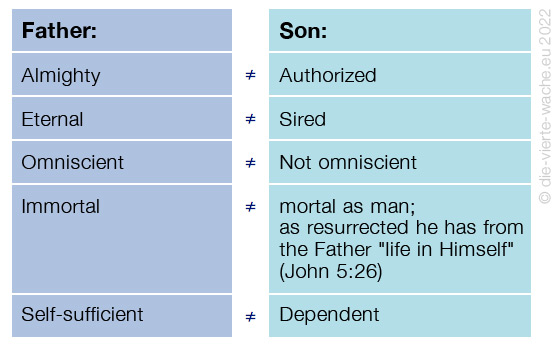Is God Triune?
What does God's own Word say? Is He one? two? or three?
Using thoughts from Hans Peter Ehrsam | 2023-03-19
The Trinitarian Creed is uttered with faith by many today:
"I believe in
♥ God the Father,
♥ God the Son, and
♥ God the Holy Spirit."
In this, all three persons are considered equally powerful, equally eternal, and yet they are not three gods, but ONE God: a sacred mystery or secret.
As a comparison often H2O is used, which "also" exists in three states of aggregation:
- liquid (water),
- solid (ice) and
- gaseous (steam).
(In the meantime a fourth state of aggregation is known ... but this only by the way).
Or like a tree that has three crowns but only one trunk.
Where does the doctrine of the Trinity come from?
The term "Trinity" does NOT occur in the Word of God, the Bible, not even a synonym or clear reference. That is amazing! One should really expect that from a God who calls Himself the "revealer of mysteries" in His own life manual (Daniel 2:47) – especially when it comes to something as significant as the proper conception of God's nature!
The Trinity dogma (doctrine of the Trinity) was introduced in 325 CE on the occasion of the Council of Nicaea with violence and great bloodshed. This is historically undisputed.
What are the effects of the doctrine of the Trinity?
CONFUSION, and that the heavenly Father, the origin of all being, is no longer given the appropriate reverence!
- The differences between Father (YHWH, Yahuah, Yahweh) and Son (Jesus, Yahusha, Yeshua) become blurred, both are often confused with each other under the title "Lord".
- The supreme rank, which belongs only to the Father, is likewise attributed to the Son and even to the Holy Spirit.
- Instead of the Father, only the Son sent by Him is worshipped (evangelical churches) or even mainly the Holy Spirit, who is also supposed to be Person and God (Pentecostal churches).
The concept we have of God exerts a great influence on our lives. That is why it is so important to have a clear concept of God. Therefore here is a
Brief Bible-Based Refutation of the Basic Assumptions of the Trinity Doctrine:
1. The Almighty God Yahuwah (YHWH) is not divisible.
He is One (Romans 3:30), one God and Father of all (Ephesians 4:6). For us, only One is the Almighty God, the Father (1 Corinthians 8:6).
But then why is Yahusha (Jesus) also called God in at least three biblical passages?
Two building blocks for better understanding:
1.A) "God" as a title of authority
"God" (Hebrew "el, elohim", Greek "theos") is on the one hand a title and means as much as "mighty one". This explains why Moses is also called God in Exodus 4:16. People from Israel are called gods (Elohim) because they were given full POWER over others by God the Father (Psalm 82:6; John 10:34), e.g., judges (Exodus 21:6, 22:8).
As an object of (mistaken) worship, even a piece of wood (Isaiah 44:15) or even one's own belly (Philippians 3:19) can be a "god."
"God" in biblical usage generally refers to something or someone to whom one is subordinate, comparable to a title such as "president" or "executive." To get a complete impression, it is always necessary to add who is being led (e.g., "the God of Israel").
In absolute form, as the God over all and everything,
it always and only refers to the Father Yahuwah (YHWH)
(over 2300 times in the Bible).
1.B) "God" as a nature of being
A bear begets a bear,
a man begets a man
a plant begets a plant,
and God Almighty begat a ... God.
This explains why, for example, the apostle Thomas said to the resurrected, glorified Yahusha, "My Lord and my God!" (John 20:28). He acknowledged Him as his Lord, and he recognized God, his Father, in Him (just as in many sons the Father can be recognized).
It is interesting that Yahusha's "God-ness" (nature of being: "God") is mentioned for the period of time when He was with the Father in heaven BEFORE His incarnation:



"No one has ever seen God; the only begotten God, who is at the Father’s side, he has made him known."
(John 1:18)
as well as for the period AFTER his death as a human being:



"But of the Son he says, “Your throne, O God, is forever and ever, the scepter of uprightness is the scepter of your kingdom.
9 You have loved righteousness and hated wickedness; therefore God, your God, has anointed you with the oil of gladness beyond your companions.”
(Hebrews1:8,9 ESV)
During his time as an earthly man, however, he did not call himself "God", but "the Son of Man" (his nature was "man") and "the Son of God" (designation of origin, descent, legitimation).
He was fully human, a perfect man in perfect union with the heavenly Father, just as Adam and Eve were intended to be. Had he been anything else, such as a "God-man" or hybrid being, then he could not have been an exactly corresponding ransom and counterpart to sinful Adam (1 Corinthians 15:45). Nor would it have been fair to require humans to follow in the footsteps of a "demigod."
The core problem of the Trinity dogma is therefore ...
2. The Holy Spirit is Not a Person



"And I will ask the Father, and he will give you another Helper [or advocate], to be with you forever,
17 even the Spirit of truth, whom the world cannot receive, because it neither sees him nor knows him. You know him, for he dwells with you and will be in you."
(John 14:16,17 ESV; see also John 15:26; 16:7-15; 17:26)
It is true that "spirit" is often personified in the Bible:
God's Spirit, that is, the Holy Spirit: Romans 8:9, 14
Christ's Spirit: 1 Peter 1:11
Mary's spirit: Luke 1:47
Spirits of men: 1 Cor. 14:14, 2 Cor. 7:13, Acts 17:16
However, personification does not prove personality!
Otherwise, wisdom would also have to be a literal person according to Proverbs 1:20-33; 8:7-15, Matthew 11:19 and Luke 7:35. So would sin (Romans 5:14, 17, 21; 6:12), death, or love (according to 1 Corinthians 13).
The confusion arises because it is not seen that there are linguistic figures here, like in our linguistic usage " The eye of the law " or " In the name of the law ". Is the law therefore a person? Of course not!
Biblically, God works in the hearts of believers by means of His Spirit so that they can be changed by God (see Ephesians 3:16ff, among others).
The Bible also clearly states that the Spirit of God, the Holy Spirit, is in the same connection with God as the spirit of a person is in connection with a person:



"For who knows a person’s thoughts except their own spirit within them? In the same way no-one knows the thoughts of God except the Spirit of God."
(1 Corinthians 2:11 NIV)
Just as the spirit of man cannot be separated from man himself and cannot talk to him, for example, God cannot be separated from the Holy Spirit (i.e. God's spirit).
Thus, the relationship of the Spirit of God to God Himself cannot be ascribed the same characteristics as the relationship between God and His Son. Yahusha could talk to His Father, while God's Spirit, of course, cannot talk to God. So the equivalence assumed in the Trinity dogma is not tenable; not to mention that the Holy Spirit is never called "God" in the Bible. Therefore, if someone grieves the Holy Spirit, God the Father is grieved and no one else.
Why did Stephen, too, in his vision just before his death, see only "the glory of God and Jesus at the right hand of God"? (Acts 7:55, 56) Where was the Holy Spirit? If both God the Father "is a spirit" (John 4:24) and Yahusha has been of the same spiritual nature since his resurrection (1 Peter 3:18), then surely the Holy Spirit should also have been visible to Stephen as a third person?
3. The Father is Greater
Just one word from Yahusha (Jesus) on this:



"... for my Father is greater than I."
(John 14:28b)
Thus, the assumption of equality between the Father and His Son is clearly refuted.
Was the Father "greater" only as long as Yahusha was on earth as a man? No! The Bible shows that this is also true for the past and for the present heavenly existence of Yahusha, until the distant future:



"For he [YHWH God] hath put all things under His [Yahusha´s] feet. But when he saith, all things are put under him, it is manifest that He is excepted, which did put all things under him [YHWH God].
28 And when all things shall be subdued unto him, then shall the Son also himself be subject unto him that put all things under him, that God may be all in all.
(1 Corinthians 15:27, 28 KJV)
And What About the Baptismal Formulation?
One of the most important supports of the dogma of the Trinity is the call to baptism that Yahusha gives at the end of the Gospel of Matthew:



"So you must go and make disciples of all nations. Baptise them in the name of the Father and of the Son and of the Holy Spirit."
(Matthew 28:19 NIRV)
This baptismal formula was obviously inserted in the 4th century, because the "church father" Eusebius refers to 24 older manuscripts of the Bible, which did not yet contain this formulation. We are planning a more detailed article on this important subject. If you want to delve further into the subject right now, we recommend this external article (in German).
For the rest, in the Bible reports baptism was always conducted "in the name of Jesus" or "in the name of Jesus":



"Peter replied, ‘Repent and be baptised, every one of you, in the name of Jesus Christ ..."
(Acts 2:38 NIV)
"... They had only been baptised in the name of the Lord Jesus."
(Acts 8:16 NIRV)
"So [Peter] ordered that they be baptised in the name of Jesus Christ. ..."
(Acts 10:48 NIRV)
"When they heard this, they were baptized in the name of the Lord Jesus."
(Acts 19:5 KJV)
"And now why do you wait? Rise and be baptized and wash away your sins, calling on His* name."
[*i.e. the Righteous One, Jesus, see verse 14]
(Acts 22:16 ESV)
"Or don’t you know that all of us who were baptised into Christ Jesus were baptised into his death?"
(Romans 6:3 NIV)
Appendix
In the appendix some Bible passages follow as clear proofs that YHWH alone is the highest God:



"This, then, is how you should pray:
‘ “Our Father in heaven, hallowed be your name,"
(Matthew 6:9 NIV)



"And Jesus came and said to them, “All authority in heaven and on earth has been given to me.»"
(Matthew 28:18 ESV)
[Note: given by the Father YHWH God, who alone held this power before].



"And Jesus said to him, “Why do you call me good?
No one is good except God alone.»"
(Mark 10:18 ESV)



"Therefore, in response Jesus said to them: “Most truly I say to you, the Son cannot do a single thing of his own initiative, but only what he sees the Father doing. For whatever things that One does, these things the Son does also in like manner.»"
(John 5:19 NWT)



"For as the Father hath life in himself; so hath he given to the Son to have life in himself;
27 And hath given him authority to execute judgment also, because he is the Son of man."
(John 5:26-27 KJV)



"And this is eternal life, that they know you, the only true God, AND Jesus Christ whom you have sent."
(John 17:3 ESV)



"... since there is only one God, who will justify the circumcised by faith and the uncircumcised through that same faith."
(Romans 3:30 NIV)



"For though there be that are called gods, whether in heaven or in earth, (as there be gods many, and lords many,)
6 But to us there is but one God, the Father, of whom are all things, and we in him; and one Lord Jesus Christ, by whom are all things, and we by him."
(1 Corinthians 8:5-6 KJV)



"But in fact Christ has been raised from the dead, the firstfruits of those who have fallen asleep.
21 For as by a man came death, by a man has come also the resurrection of the dead.
22 For as in Adam all die, so also in Christ shall all be made alive.
23 But each in his own order: Christ the firstfruits, then at his coming those who belong to Christ.
24 Then comes the end, when he delivers the kingdom to God the Father after destroying every rule and every authority and power.
25 For he must reign until he has put all his enemies under his feet.
26 The last enemy to be destroyed is death.
27 For “God[3] has put all things in subjection under his feet.” But when it says, “all things are put in subjection,” it is plain that he is excepted who put all things in subjection under him.
28 When all things are subjected to him, then the Son himself will also be subjected to him who put all things in subjection under him, that God may be all in all."
(1 Corinthians 15:20-28 ESV)



"Wherefore God also hath highly exalted him, and given him a name which is above every name,"
(Philippians 2:9 KJV)



"The Son is the image of the invisible God, the firstborn over all creation."
(Colossians 1:15 NIV)



"To the King of the ages, immortal, invisible, the only God, be honor and glory forever and ever. Amen."
(1. Timothy 1:17b ESV)



"For there is one God, and there is one mediator between God and men, the man Christ Jesus,
6 who gave himself as a ransom for all, which is the testimony given at the proper time."
(1 Timothy 2:5-6 ESV)



"and from Jesus Christ, who is the faithful witness, the firstborn from the dead, and the ruler of the kings of the earth. To him who loves us and has freed us from our sins by his blood,
6 and has made us to be a kingdom and priests to serve his God and Father – to him be glory and power for ever and ever! Amen."
(Revelation 1:5-6 NIV)



"[Yahusha says:] I am coming soon. Hold fast what you have, so that no one may seize your crown.
12 The one who conquers, I will make him a pillar in the temple of my God. Never shall he go out of it, and I will write on him the name of my God, and the name of the city of my God, the new Jerusalem, which comes down from my God out of heaven, and my own new name.
13 He who has an ear, let him hear what the Spirit says to the churches."
(Revelation 3:11-13 ESV)



"And immediately I was in the spirit: and, behold, a throne was set in heaven, and one sat on the throne."
(Revelation 4:2 KJV)



"Day and night, they never stop saying, ‘ “Holy, holy, holy is the Lord God who rules over all.” He was, and he is, and he will come.’
9 The living creatures give glory, honour and thanks to the one who sits on the throne. He lives for ever and ever.
10 At the same time, the 24 elders fall down and worship the one who sits on the throne. He lives for ever and ever. They lay their crowns in front of the throne. ..."
(Revelation 4:8b-10 NIRV)



"And I heard every creature in heaven and on earth and under the earth and in the sea, and all that is in them, saying, “To him who sits on the throne and to the Lamb be blessing and honor and glory and might forever and ever!”
14 And the four living creatures said, “Amen!” and the elders fell down and worshiped."
(Revelation 5:13, 14 ESV)



"To the one who is victorious, I will give the right to sit with me on my throne, just as I was victorious and sat down with my Father on his throne."
(Revelation 3:21 NIV)



